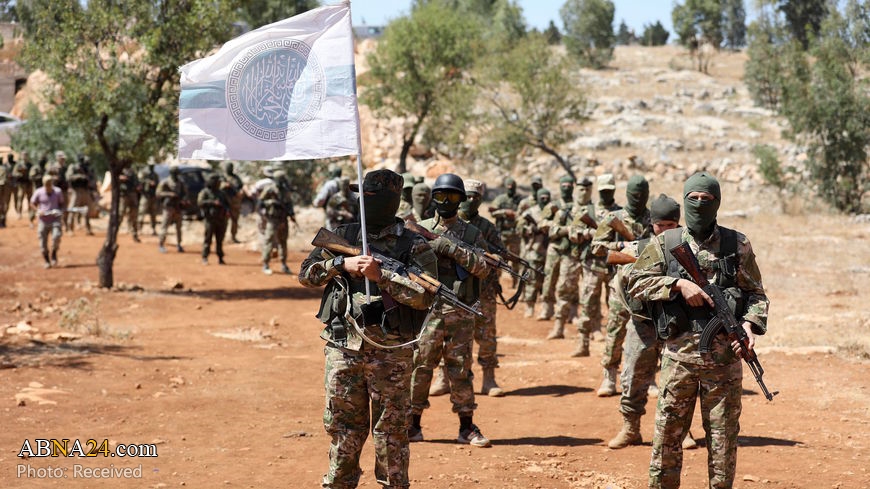AhlulBayt News Agency (ABNA): Although the Saudi-led Arab military coalition has persistently tried to say that one of the main goals of its war in Yemen was to prevent the growth of terrorist groups like al-Qaeda and ISIS in the Arabian Peninsula, the anti-Yemeni war fully revealed the strong relations between the alliance forces and the branches of al-Qaeda and ISIS.
The documents disclosed
Yemen’s Ypagency news outlet on Saturday reported about a document circulated in social media that shows a senior al-Qaeda leader has asked for high military ranks for a number of al-Qaeda members following a pact signed between him and the Arab alliance.
Saleh al-Oubaidi, an officer at the alliance, on Saturday in a Facebook post exhibited a note sent to the defense ministry of the resigned Yemeni President Abdrabbuh Mansour Hadi according to which a top human trafficker who is a member of al-Qaeda on the Yemeni-Saudi borders has called for military ranks for some of the terrorist group’s members in Yemen.
Citing some sources, al-Oubaidi revealed that the commander of Azal Axis and 102nd Brigade on the southern Saudi borders Yasser Abdullah Ahmed al-Mabri, under “Abu Oubaida” nom de guerre, before the war was a top al-Qaeda leader in Baqem and then joined the forces of Tariq Afash, the nephew of the former president Ali Abdullah Saleh.
Saudi Arabia formed in Baqim a force containing a number of brigades having hundreds of members of al-Qaeda and ISIS as their members. Some of these terrorists, like Abu Hamal al-Harbi, Jahad al-Hanbasi, Jamal al-Awlaqi are wanted by the US.
Further information shared by al-Oubaidi held that Saudi Arabia’s intelligence hired for service in several brigades in the border regions with Yemen and with high military ranks members of Al-Qaeda who during interrogation admitted working for Abu Oubaida.
These terrorists, hired by the Saudis as members of the Yemeni army and granted military ranks, even do not respond to the Hadi’s defense ministry.
The coalition leaders detained many Yemeni military commanders who called for a probe into the presence of terrorist fighters within the ranks of the Arab coalition forces on the frontlines and the occupied Yemeni regions and also southern borders of the kingdom, al-Oubaidi further revealed.
According to the report, so far Abu Oubaida deployed thousands of the Saudi-hired mercenaries to dangerous battels and fronts to have them killed without military planning, air cover, or even prior knowledge of the coalition’s command center.
On March 22, Aljazeera news network aired a documentary titled “death on the borders” displaying the plight of the Yemeni mercenaries on the southern Saudi borders.
Al-Qaeda in place of the Muslim Brotherhood
One of the important issues that make Saudi Arabia drift towards Al-Qaeda is Egypt and the UAE’s discontentment with the continuation of the Saudi cooperation with the Muslim Brotherhood-affiliated Islah Party of Yemen in the Saleh government.
On Monday, Hadi made new military decisions sacking key military leaders at the Islah Party in Taiz province. Sadeq Sarhan, the commander of the so-called Mika 22nd Brigade, and Abdulaziz al-Majidi, the commander of the 170th Air Brigade, were the Islah members sacked by Hadi.
In late November, Abyan’s governor Saleh al-Junaidi noted that Saudi Arabia plans to hand over the province to al-Qaeda terrorists. At the time, Southern Transitional Council (STC) accused the Saudis of stationing military forces, including al-Qaeda and ISIS fighters, in Abyan. General Mohammad al-Zamiki, a southern militia commander in Abyan, said that his forces killed 40 fighters among them al-Qaeda and ISIS members from Ma’rib province.
The al-Qaeda-Saudi cooperation did not remain hidden from international media and every day new documents of this relationship came out. The AP news agency in a report published on August 6, pointed to the Saudi and Emirati partnership with the al-Qaeda.
In February 2019, CNN, pointing to the severe clashes in Taiz, said that al-Qaeda made a useful alliance to the Saudi-loyalist militants who fought beside the terrorist group.
According to the report, Abu al-Abbas Brigade held US-made armored vehicles and weapons. Abu al-Abbas, the founder of this al-Qaeda-aligned force, in 2017 was blacklisted by the US for al-Qaeda and ISIS Yemen branches funding.
This large number of documents is published while the West, and particularly the US, turns a blind eye to the reality of the Saudi-al-Qaeda alliance in committing crimes against the Yemeni nation. The Western countries even claim to be fighting terrorism to justify their occupational presence in various parts of West Asia and Africa. But Yemen war has proven that neither counterterrorism claims nor humanitarian gestures of the West are true.
/129

